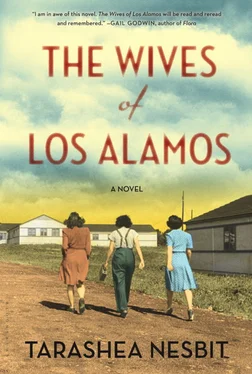SOME OF OUR husbands left first. We watched them disappear into train terminals, through the doors of unmarked black sedans, down airport runways, and we were left behind, overwhelmed. We called our friends from the phone booth and they met us at the train station or at our house with a loaf of bread, or a chicken casserole and a flask. We wondered aloud how we would ever survive without our friends to comfort us. We wanted to tell them everything we knew and everything we worried about—how scared we were and how excited. We wanted to ask their advice about what to bring to the Southwest—dresses, shoes, lotions—but we could not.
ON OUR LAST day we went to see Oklahoma! on Broadway or For Whom the Bell Tolls at the Mayan Theatre and we ate at the Italian restaurant, Luciano’s, that we had always wanted to try. We returned our library books, we picked up a copy of the family medical records, we took a long walk alone and asked ourselves why we had not done this sooner. We saw, for what seemed like the first time, the things we liked about the city we were leaving—whispering to the other wives at the community swimming pool, seeing women our mothers’ ages leaning in close to one another at the teahouse. And though we never actually went to the teahouse we found ourselves smiling every time we walked by it. We thought we would be joyful saying good-bye to the unfriendly pharmacist, Mr. Williams, but that was not true.
WE TOOK THE car to the shop to get the oil changed. We dropped off our children’s old bike tires, our worn-out bathing cap, and a bucket of nails our husbands left in the garage at the Junior League’s Metal and Rubber Drive. We bought a few more war bonds. Some of us had been smart enough to ask about gas and electric, and on our last day we bought an electric toaster, because we were told that where we were going would not have natural gas. We went to the ration office and handed a sealed envelope to the woman at the counter, as our husbands had instructed. She read the letter inside, gave us a curious look, and provided us with enough gas rations to get our car to the other side of the country.
WE WENT TO Barbara’s and got a manicure; we requested a bright cherry red, even though we knew it would chip by the end of the day. We sewed curtains for rooms we had never seen, hoping the colors would look right and the dimensions would be correct. We packed the linens and not the piano, and we were secretly happy to realize our children would not be able to continue lessons where we were going—we were told there was no piano teacher—which meant we would no longer have to hear them practicing Chopsticks over and over again.
OR WE WERE appalled our children would not have the necessary experience of piano at a young age and though we did not think we made good teachers—we were too soft, or we were too impatient—once we arrived and unpacked our dishes, we volunteered to teach piano in the lodge, which was also the movie theater, the gymnasium, and the community mess hall. Several children would learn to play Bach after dinner.
WE LIED AND told our children we were packing because we would be spending August with their grandparents in Denver or Duluth. Or we said we did not know where we were going, which was the truth, but our children, who did not trust that adults went places without knowing where they were going, thought we were lying. Or we told them it was an adventure and they would find out when we got there.
THE MOVERS CAME and out went our sofa, our books, and our cutlery. As they loaded boxes, our neighbors drove past, slowed down, doubled back, and asked, Where you headed? , and, Why didn’t you tell us? We would have thrown you a party , and, You’ve been great neighbors. You’ll be missed . We said, Vacation , or, Change of scenery , or, Jim’s work . Our neighbors did not believe us, though they smiled as if they did.
WE BOARDED TRAINS in Philadelphia, or in Chicago, with GIs all looking identical in their dog tags, their black-rimmed glasses, their gosling-short hair. Perhaps it was unpatriotic, but we were annoyed at the GIs who ate before us and delayed our dinners until ten o’clock, and who therefore made our children less manageable. Though we were only twenty-five, we were tired, and we were with our children, who reminded us of what we were tethered to, children who were bored for hours and who pinched and kicked one another. When our children whined, He hit me! She started it! after eight hours on the train we ran out of ways to keep them occupied, and instead we finally just stared out the window as if we were noticing the beige nuances of tan landscapes, which we were not. By the time we arrived we had seen so many mountains they had lost any sense of the majestic.
OR, LESS FREQUENTLY, our husbands went with us. They drove us in red Studebakers, in green Oldsmobiles, our backseats filled with clothes, books, children, and the family cat, Roscoe, who meowed for hours. We stopped along the way to visit our parents, who asked repeatedly where we were going, and whom we could not tell.
OUR FATHERS POUNDED their fists on the table, said, You think we are Nazi spies? Tell us! Our mothers said, Be careful . Or, Write me as soon as you can . And our children got fearful, and cried, Tell them , but we did not tell them, or our children. Later, when our fathers cooled off, when they said, touching our arm, I’m your father, you can tell me anything , we did not tell them where we were going, because we still did not know.
WE HUGGED OUR mothers, pecked our fathers on the cheek, glanced out the window to see our husbands checking the air pressure in the tires. Our mothers understood; our mothers had kept great secrets. We loaded up the children, the cat, and the snacks, and headed west.
WE WERE ROUND-faced, athletic, boisterous, austere, thin-boned, catlike, and awkward. When we challenged people’s political views we were described as stubborn or outspoken. Our fathers were academics—we knew the academic world. We married men just like our fathers, or nothing like them, or only the best parts. As the wives of scientists in college towns we gave tea parties and gossiped, or we lived in the city and hosted cocktail hours. We served cigarettes on tin trays. We leaned in close to the other wives, pretending we were good friends, cupping our hands and whispering into their ears. And, most importantly, we found out how to get our husbands tenure.
NOT ALL OF us were born in America and not all of us knew the academic world. Some of our parents had immigrated while our own mothers were in their third trimester with us, and some of us had immigrated when we were newly married and not yet pregnant ourselves. We left Paris when we heard the Germans were taking over the city, or we left Italy when we woke one cold January morning to hear a Nazi anthem being sung in an upbeat tenor outside our bedroom window. We asked, What is happening to the world? We packed two suitcases. Our husbands told the military men at the checkpoint we were just leaving on holiday, and we boarded a plane to America instead.
SOME OF US remembered World War I from the vantage point of elementary school age worries—going without salt, butter, and cookies—and now as young adults we did not want to get involved.
OR WE THOUGHT about the December morning in 1941 when the Japanese—depending on who told the story—were angered by trade embargoes that restricted their purchase of oil and metals, or wanted to possess all of the islands in the Pacific Ocean. We went to Spanish Relief parties the night before Pearl Harbor with our husbands, and the next day, when the war broke out, we both decided there were more pressing crises than the Spanish cause. That was three years ago, and we had followed so much news it was hard to keep up. But we knew this: Germany’s Hitler and Italy’s Mussolini were taking over Europe. Japan’s Tojo was dominating the Pacific. We heard Japan was getting closer to their goal—they had captured Borneo, Java, and Sumatra, they had overthrown the British-ruled Singapore—and in Europe the news of German occupations gave many of us the desire to do something . The Axis and the Allies. Would it never end?
Читать дальше












